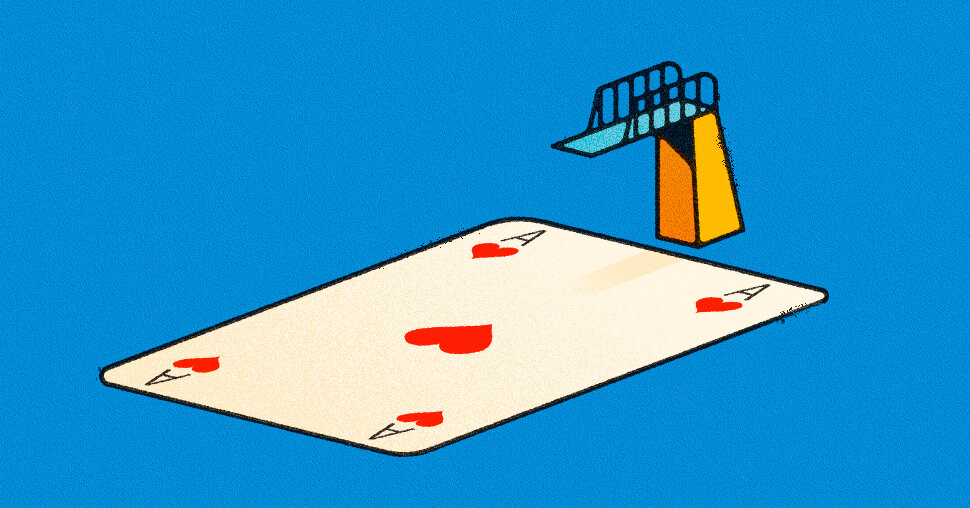In math class in high school, my friends and I would gamble on a card game called Tunk. Our teacher, a nice young man whom we gently ignored, was too overwhelmed by the demands of his job to pay much attention to the budding degenerates in the back of the classroom. Our school had just opened up a Taco Bell stand in the cafeteria. My friends and I did not have much money at the time, so we resorted to gambling with our classmates for taco funds.
I was thinking about Tunk last month when New York became one of 30 or so states that have legalized sports gambling either online or in person. On the first day, a lot of my friends who live there downloaded a gambling app to their phones, deposited some cash and sweat out their first bets. A majority of these friends, I imagine, will wager on a few games before they lose interest and move on. A couple might bet consistently, but responsibly, mostly out of boredom. But one or two might wander down a sordid path and find themselves deep in the throes of a gambling addiction.
I spent much of my 20s playing poker, both online and in various card rooms in New York City and Los Angeles. This was a terrible time, not only because I lost a lot of money, but also because gambling hollows you out and melts down all your ambitions and plans for the future. I won’t bore you with too many details — if you’re interested, I wrote an essay about it in 2010 — but just know it was pretty bad.
Did this problem start with Tunk for taco money? Or did it start roughly five years later when televised poker blew up? Was I swayed by the thousands of online poker ads I saw in the early 2000s? Or was there just some chemical in my brain that would have found a table and a deck of cards no matter where I was?
The scientific community seems to have begun providing answers to some of these questions: One study from Spain showed a “significant increase in young pathological gamblers” since the legalization of online gambling. Proximity and ease of access have mattered in the past, and now that everyone in legalized states can bet on their apps, a major barrier between future addicts and their fixes has been removed.
But before we envision a country of rundown addicts selling baby formula to place one last parlay into their phones, we should consider the ubiquity of sports gambling even before the apps showed up. Billions of dollars are bet on the Super Bowl every year. Before broad legalization began about four years ago, only a portion of those bets were taken in Las Vegas. ESPN recently estimated that “under the table” bets on N.F.L. and college football games alone exceeded $95 billion per year. (Under the table generally refers to bets taken by a bookie or through an offshore gambling site.) The point is, people have always bet on sports, and they probably always will, legally or not.
Last week, my colleague and friend Kurt Streeter wrote a story about people whose lives have been ruined by sports betting. He compared the flush gambling companies’ aggressive marketing to the tobacco industry’s tactics before the turn of the last century. There is, as Streeter points out, almost no federal oversight of any of these ads. Which brings up the question: If we all agree that gambling is an addiction that can ruin lives, why do we allow these online sportsbooks to push their product onto the masses?
Last Sunday, a bettor turned $20 into over half a million when he bet on the exact final scores of both the N.F.C. and A.F.C. championship games. His odds of winning were around 1 in 29,000. My social media feeds, which serve me up a steady diet of gambling content, were dominated by stories of what the sports business reporter Darren Rovell called “the greatest bet of all time.” Gambling depends on these sorts of narratives to survive — all losers need to believe they’re one mega long shot away from getting whole.
Tales of long shots coming in aren’t anything new, but the past five years have seen an explosion in sports-betting content that has coincided with an increased interest in cryptocurrencies, a resurgence in the sports memorabilia and trading cards market and the advent of Robinhood and its armies of memestock traders. All these things are forms of gambling.
People have collected sports cards, traded volatile stocks and bet on the N.F.L. for generations, of course. What seems different these days is that the pretense of responsible gambling or investment has been dropped. If you go on Instagram or TikTok, for example, you’ll find hundreds of accounts dedicated to opening packs of sports cards in search of incredibly rare inserts that can sell for hundreds of thousands of dollars.
This differs from the more workmanlike card-collecting culture of my youth in the late ’80s and early ’90s, where you would try to find rookie cards in the hopes that the player would turn into a superstar. Back then, a card that gained $50 in value over a number of years would be considered a significant win. Today, kids spend thousands of dollars on digital packs that more or less function like Willy Wonka chocolate bars — one lucky person might find the golden-ticket Luka Doncic jersey rookie card worth $4.6 million or whatever, while everyone else loses his and her entire investment.
Similarly, sports gambling companies have begun to hype different types of “parlays,” which allow a bettor to combine several wagers into one super ticket. Last weekend’s “greatest bet of all time” was a parlay that no sportsbook would have taken before online betting. This isn’t because it carried too much risk to the casino — every house would gladly take a bet with 1-in-29,000 odds — but rather because there was simply no market for it. Today, many popular sports podcasts are sponsored by some sports betting app that offers “same game parlays” and the like.
This constitutes quite a change from the olden days of sports betting, when you would call in, say, five bets to your local bookie and lose three, win two, and come out slightly behind on the entire transaction. There also should be little doubt that legalization will lead more people to gamble. The relevant question, then, is whether the size and duration of a surge will lead to significant societal harm that offsets both the tax and recreational benefits of legalized gambling.
I am somewhat skeptical that today’s broad legalization will lead to a long-term epidemic of problem gambling. These apps mostly seem to be targeting young, male sports fans who, in past eras, would have just found their way to an offshore site or a bookie. They may end up losing more money on beefed-up, absurd parlays, but they were probably going to end up broke anyway because most gamblers lose over the long term.
But I do think there’s something troubling about how I can no longer really tell the difference between buying cryptocurrencies, betting on sports or trading stocks. The narratives have all converged into one mega gamble with payouts that could change your life, whether through parlay, or investing in NFTs or GameStop stock. This doesn’t really tell us much about the companies behind these products — they are just doing whatever it takes to maximize their user bases and profits — but I wonder if it reflects a desperation in today’s youth that has only been exacerbated by the uncertainty and fear of the past two years.
Have feedback? Send me a note at kang-newsletter@nytimes.com.
Jay Caspian Kang (@jaycaspiankang), a writer for Opinion and The New York Times Magazine, is the author of “The Loneliest Americans.”


























